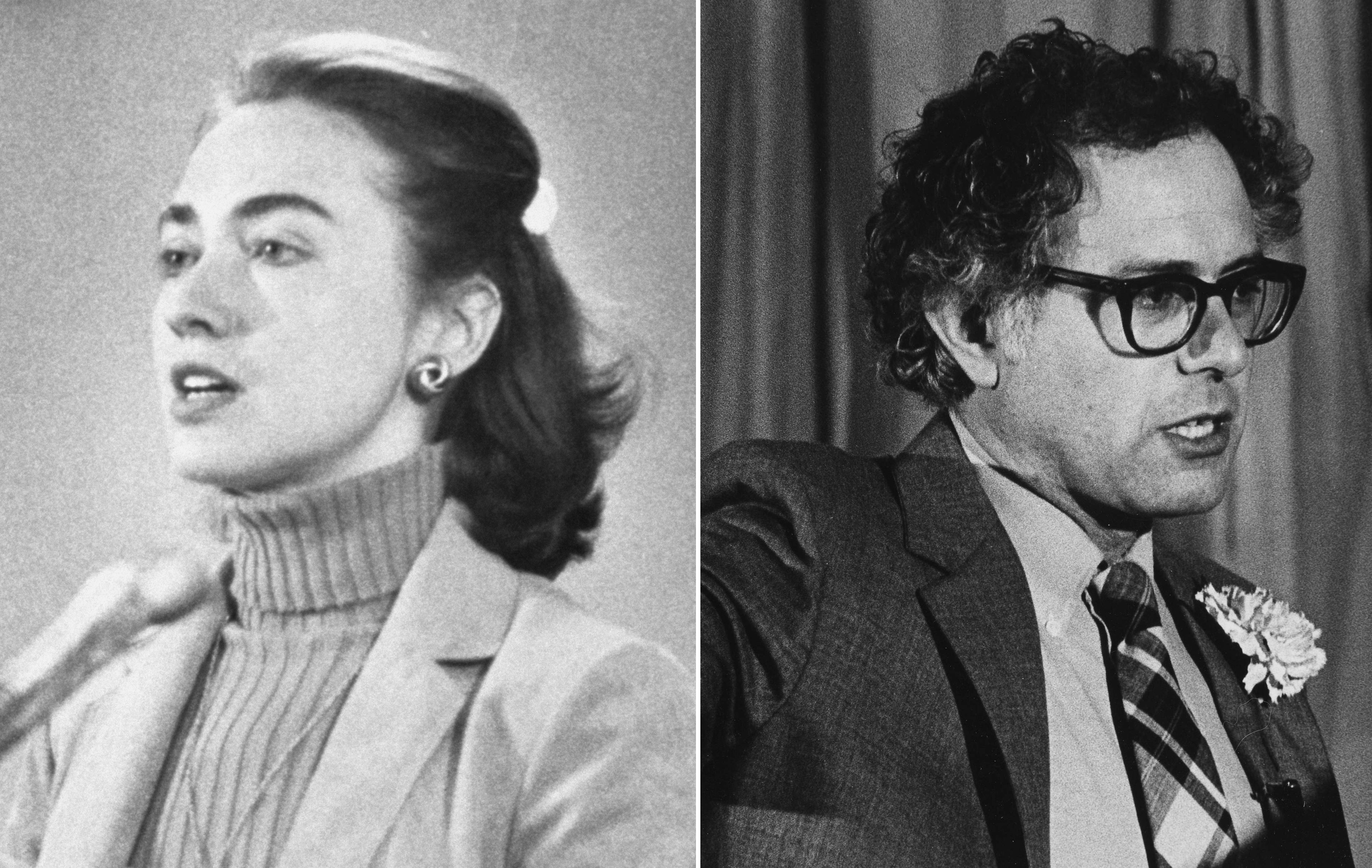What really shaped Hillary Clinton and Bernie Sanders
It's not ideology


On Wednesday night, Hillary Clinton and Bernie Sanders had a debate co-sponsored by Univision, in which they argued about immigration, despite the fact that their positions aren't all that far apart. At one point Clinton criticized Sanders for voting against a comprehensive reform bill in 2007, and the moderators played video of him criticizing the bill by saying he worried that immigrants drive down wages for native-born Americans. This followed on Sanders' surprise win in Michigan, which many believe had a good deal to do with Sanders' criticism of trade deals that Clinton has supported in the past.
Those two events highlight an important difference between these two candidates, and hold a broader lesson about our politics in general. It isn't about ideology so much as it's about what shapes a politician: the places where they come from, their relationship to their parties, and the breadth of their ambitions.
Let's start with Sanders. He grew up and came of age in Brooklyn, and was a student activist in college. But the most important decision he made in his political life was his move to Vermont in his 20s. A state that is both firmly liberal and almost entirely white allowed Sanders to build a political career without having to alter the radical politics he came to as a young man. He stayed an independent until his run for president, and was able to become mayor of Burlington, a member of the House, and then a senator, without being too concerned about the kind of coalitional, transactional politics that characterize the Democratic Party in most other places.
The Week
Escape your echo chamber. Get the facts behind the news, plus analysis from multiple perspectives.

Sign up for The Week's Free Newsletters
From our morning news briefing to a weekly Good News Newsletter, get the best of The Week delivered directly to your inbox.
From our morning news briefing to a weekly Good News Newsletter, get the best of The Week delivered directly to your inbox.
That's why the Bernie Sanders of today isn't that different from the Bernie Sanders of 20 or 30 years ago. And it's why he has stumbled from time to time in dealing with some of the party's main constituency groups, like African-Americans and Latinos, sometimes saying the wrong thing at the wrong time — not because he doesn't sympathize with them and share their goals, but because he isn't practiced at working with them.
It's also why he may have other votes in his past that could be problematic: When he voted against the 2007 immigration bill, he didn't have to worry about it costing him Latino votes in his next election. If Sanders ever contemplated a run for president, it was probably one like he began last year and where he may end up: more as an ideological crusade than a nuts-and-bolts effort to win over the Democratic Party piece by piece.
Clinton, on the other hand, began her career in her husband's home state of Arkansas, which contains lots of African-Americans and lots of conservative whites, both of whom Bill was adept at appealing to. From the beginning, she was deeply embedded in the Democratic Party and had national ambitions. At what point they became ambitions for herself as well as for her husband, I really can't say, but they were both always aware of where the party as a whole was and where it was headed. She then spent eight years as the wife of the party's leader and another eight representing New York, which is both incredibly diverse and a place where the party is a complex collection of characters, groups, and interests that have to be balanced.
That means that Clinton has had a lot more practice at handling the Democratic Party's constituencies than Sanders has, coming from his rather bucolic northern home. It also means that unlike Sanders, Clinton had to move as the party's consensus moved, sometimes in small ways but sometimes in larger ways.
A free daily email with the biggest news stories of the day – and the best features from TheWeek.com
There are times when this history has worked to Sanders' advantage, by virtue of timing if nothing else. For instance, Clinton was part of the elite Democratic Party consensus on trade, which essentially embraces the principle of free trade, seeks to forge trade agreements, and hopes to mitigate the negative effects of those agreements with provisions meant to help workers and protect the environment. You can argue that agreements like NAFTA have failed to do that mitigation, but that was the idea as Democrats who supported the agreement saw it at the time.
Sanders was never part of that party consensus in the first place, and never changed his stance, so now that the free trade position is a liability in places like Michigan, he has nothing to answer for or distance himself from. He could rail against NAFTA and the Trans-Pacific Partnership — which Clinton ultimately came out against after an extended period of deliberation — without reservation and without worry that a position he took 20 years ago could hurt him. Clinton, on the other hand, was left to explain the sometimes complex Democratic position on NAFTA, trying to convince voters that she understands their anger about the agreement and about the dislocation they blame on it, even though she had backed it. That's a much less clear position to take, and one unlikely to be all that persuasive.
While much has been made of the question of whether Sanders can appeal to non-whites, the fact that Vermont is almost all-white is only part of the explanation for why. Just as important is the fact that Vermont allowed Sanders to build a career as an independent, where the makeup and positions of the Democratic Party were of limited concern for him. Hillary Clinton, on the other hand, is about as much a creature of her party as any politician could be. In the end, that will be an important reason why she ends up being that party's presidential nominee.
Paul Waldman is a senior writer with The American Prospect magazine and a blogger for The Washington Post. His writing has appeared in dozens of newspapers, magazines, and web sites, and he is the author or co-author of four books on media and politics.
-
 The week’s best photos
The week’s best photosIn Pictures A fireman's ladder, a race through the desert, and more
-
 NASA discovered 26 microbes in their cleanrooms
NASA discovered 26 microbes in their cleanroomsUnder the radar The bacteria could contaminate space
-
 The elite falcon trade in the Middle East
The elite falcon trade in the Middle EastUnder the Radar Popularity of the birds of prey has been ‘soaring’ despite doubts over the legality of sourcing and concerns for animal welfare
-
 The billionaires’ wealth tax: a catastrophe for California?
The billionaires’ wealth tax: a catastrophe for California?Talking Point Peter Thiel and Larry Page preparing to change state residency
-
 Bari Weiss’ ‘60 Minutes’ scandal is about more than one report
Bari Weiss’ ‘60 Minutes’ scandal is about more than one reportIN THE SPOTLIGHT By blocking an approved segment on a controversial prison holding US deportees in El Salvador, the editor-in-chief of CBS News has become the main story
-
 Has Zohran Mamdani shown the Democrats how to win again?
Has Zohran Mamdani shown the Democrats how to win again?Today’s Big Question New York City mayoral election touted as victory for left-wing populists but moderate centrist wins elsewhere present more complex path for Democratic Party
-
 Millions turn out for anti-Trump ‘No Kings’ rallies
Millions turn out for anti-Trump ‘No Kings’ ralliesSpeed Read An estimated 7 million people participated, 2 million more than at the first ‘No Kings’ protest in June
-
 Ghislaine Maxwell: angling for a Trump pardon
Ghislaine Maxwell: angling for a Trump pardonTalking Point Convicted sex trafficker's testimony could shed new light on president's links to Jeffrey Epstein
-
 The last words and final moments of 40 presidents
The last words and final moments of 40 presidentsThe Explainer Some are eloquent quotes worthy of the holders of the highest office in the nation, and others... aren't
-
 The JFK files: the truth at last?
The JFK files: the truth at last?In The Spotlight More than 64,000 previously classified documents relating the 1963 assassination of John F. Kennedy have been released by the Trump administration
-
 'Seriously, not literally': how should the world take Donald Trump?
'Seriously, not literally': how should the world take Donald Trump?Today's big question White House rhetoric and reality look likely to become increasingly blurred
